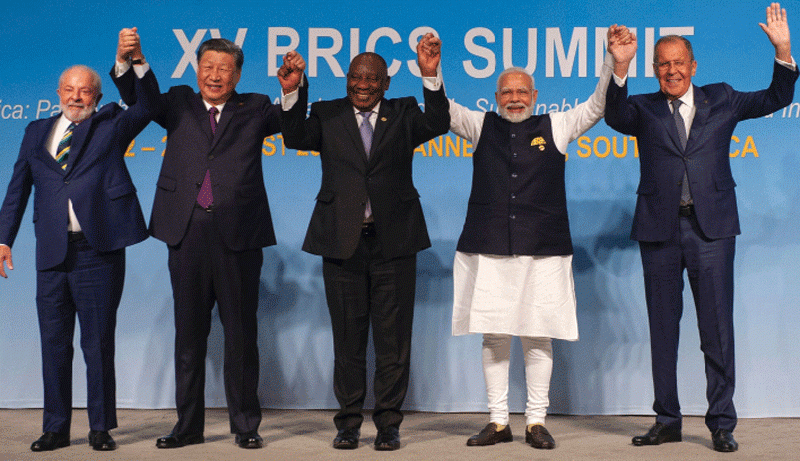
CO-OPERATION was the defining term of the recently concluded Brics summit in Johannesburg. The phrase is repeated no less than 77 times in the final declaration.
This is welcome in a world increasingly characterised by disengagement, de-risking, trade wars and escalating regional security threats.
Yet beneath the cooperative comfort blanket in which South Africa wrapped itself so snugly and smugly lies the harsh reality of intensifying global competition.
This was powerfully illustrated by the timing of India’s historic moon landing at the peak of the summit, contrasted with Russia’s failure the week before.
The summit declaration text references the term “competition” just twice, however, committing to “deepen cooperation on competition among Brics countries” which, prima facie, constitutes a contradiction of global proportions.
At face value, this commitment to “cooperate on competition” would presumably compel the Brics to boost South Africa’s competitiveness in Asia, Eastern Europe and Latin America.
Conversely, following this logic, the declaration would see Pretoria cooperating with the Brics to aid their respective competitiveness in the lucrative African market – a continent in which South Africa enjoys significant first-to-market advantage in mining, retail, telecoms and banking.
But what does it mean to be globally competitive? Why is it important and where does South Africa rank?
- Zim headed for a political dead heat in 2023
- Experts downbeat as Ncube cuts GDP forecasts
- Record breaker Mpofu revisits difficult upbringing
- Tendo Electronics eyes Africa after TelOne deal
Keep Reading
Global competitiveness indexes typically evaluate pillars of a country’s political economy such as its institutions, infrastructure, macroeconomic stability, financial system, product market and labour market, business dynamism, ICT adoption and innovation capability.
Productivity
Yet the core of a country’s competitiveness lies in its productivity.
Examining the competitiveness of South Africa’s Brics partners, all are more competitive.
The authoritative Institute of Management Development World Competitiveness Yearbook measures and evaluates 335 competitiveness criteria and ranks China 17th, India 37th, Russia 43rd, Brazil 59th and South Africa 60th (out of 63 countries measured), but with vastly different economies.
One key factor in global competitiveness is the ease of doing business in the country. In this regard, South Africa has progressively slid from a high of 32nd on the World Bank’s Ease of Doing Business Index to its current 84th position out of 190 economies measured.
Economist Jeffrey Sachs defines a country’s global competitiveness as its ability to achieve sustained economic growth in the medium term (five years).
But rather than abstract indexes of an international league table, arguably the most important measure and consequence of global competitiveness is a country’s ability to provide high levels of prosperity to its citizens.
Demonstrably, on this measure, South Africa is less competitive than its Brics partners.
A further challenge confronting South Africa is the rapidly changing nature of global competitiveness.
At the macro level, how a nation takes advantage of and competes in the Fourth Industrial Revolution is of increasing importance.
Here, a country’s performance in factors such as innovation, technology, human capital and flexibility are key.
Again, South Africa is a comparatively poor performer in all four factors.
Moreover, South Africa’s historical global comparative advantage in minerals and mining is waning.
The authoritative 2022 Simon Fraser Mining Investment Attractiveness Index ranks South Africa as the 57th least attractive jurisdiction for mining investment, below that of the DRC, Papua New Guinea and Tanzania.
Weaker global demand for South Africa’s minerals, particularly from key Brics partner China, energy disruptions and logistics blockages in both rail and harbours have further eroded this once globally competitive advantage.
Global competitiveness
So, rather than a wishful reliance on the cooperation of its Brics partners, how can South Africa configure its national economy to be more competitive, particularly with the prospect of an expanded Brics+ grouping further diluting
Pretoria’s influence on the global stage? A first step is to re-introduce the concept of global competitiveness into the national public narrative.
Even under the globally ambitious Mbeki presidency, South Africa was cautious about articulating a national objective of global competitiveness.
Naively, the country’s economic and developmental aspirations were often subsumed under the homogenising rubric of an African renaissance, the promotion of which would immutably deliver benefits for the country. It has not.
But the overarching requirement for South Africa to become globally competitive in its chosen areas of specialisation is for closer domestic cooperation between its public and private sectors.
Take, for example, tourism. Unlike its diminishing minerals, South Africa’s natural endowment is relatively permanent and renewable.
The sector contributes in excess of US$13 billion to the economy and constitutes a greater percentage of GDP than agriculture, utilities and construction.
Tourism is a consistent earner of hard currency and a significant FDI and employment multiplier.
Yet South Africa sees precious little benefit to tourism from its cooperation with Brics countries. For example, in 2022, out of a population of 1,3 billion, just 632 Chinese tourists visited our shores. Of its population of 214 million, little more than 26 000 Brazilians visited South Africa last year.
Yet in budgetary terms, the Department of Tourism is a minnow and a political orphan, with the institutional problems of Tourism South Africa making the headlines for all the wrong reasons.
South Africa’s private sector has demonstrated its competitive abilities – it now needs the government to deliver on the promised dividend of greater cooperation from our Brics partners to deliver prosperity for all.
- Kilbride is an honorary professor at Stellenbosch Business School, and chairperson of Spirit Invest and the Spirit Foundation.











